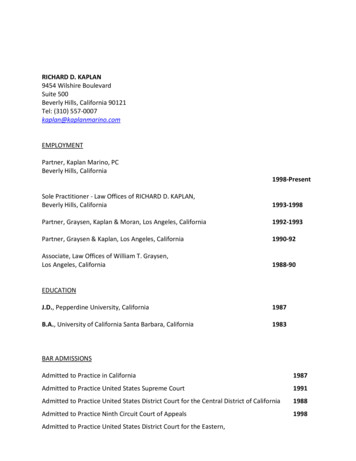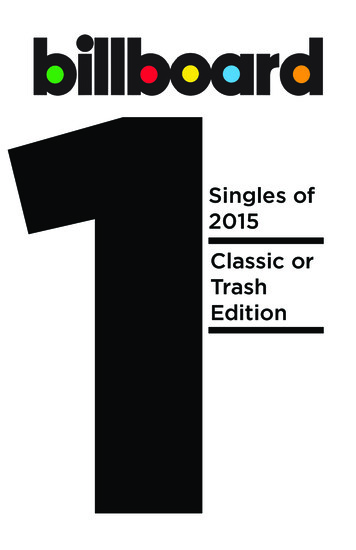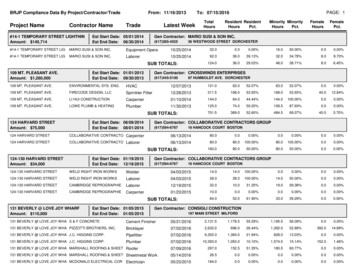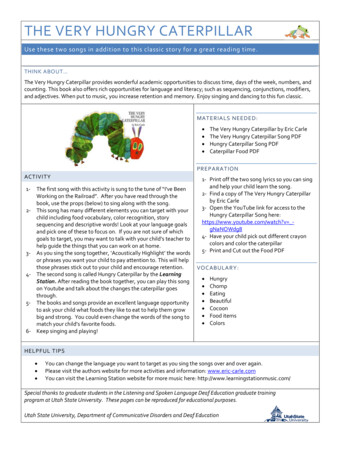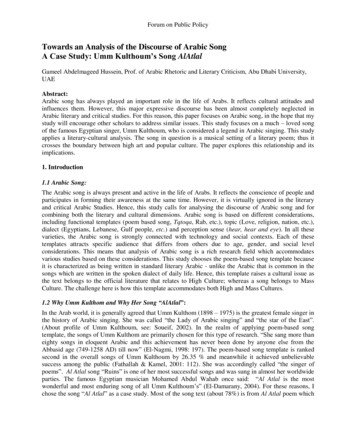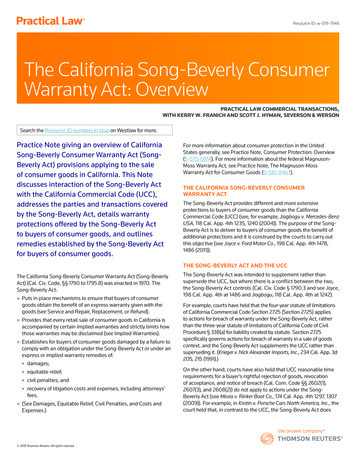
Transcription
Resource ID: w-019-7946The California Song-Beverly ConsumerWarranty Act: OverviewPRACTICAL LAW COMMERCIAL TRANSACTIONS,WITH KERRY W. FRANICH AND SCOTT J. HYMAN, SEVERSON & WERSONSearch the Resource ID numbers in blue on Westlaw for more.Practice Note giving an overview of CaliforniaSong-Beverly Consumer Warranty Act (SongBeverly Act) provisions applying to the saleof consumer goods in California. This Notediscusses interaction of the Song-Beverly Actwith the California Commercial Code (UCC),addresses the parties and transactions coveredby the Song-Beverly Act, details warrantyprotections offered by the Song-Beverly Actto buyers of consumer goods, and outlinesremedies established by the Song-Beverly Actfor buyers of consumer goods.For more information about consumer protection in the UnitedStates generally, see Practice Note, Consumer Protection: Overview(5-575-0814). For more information about the federal MagnusonMoss Warranty Act, see Practice Note, The Magnuson-MossWarranty Act for Consumer Goods (0-581-0467).THE CALIFORNIA SONG-BEVERLY CONSUMERWARRANTY ACTThe Song-Beverly Act provides different and more extensiveprotections to buyers of consumer goods than the CaliforniaCommercial Code (UCC) (see, for example, Jiagbogu v. Mercedes-BenzUSA, 118 Cal. App. 4th 1235, 1240 (2004)). The purpose of the SongBeverly Act is to deliver to buyers of consumer goods the benefit ofadditional protections and it is construed by the courts to carry outthis objective (see Joyce v. Ford Motor Co., 198 Cal. App. 4th 1478,1486 (2011)).THE SONG-BEVERLY ACT AND THE UCCThe California Song-Beverly Consumer Warranty Act (Song-BeverlyAct) (Cal. Civ. Code, §§ 1790 to 1795.8) was enacted in 1970. TheSong-Beverly Act: Puts in place mechanisms to ensure that buyers of consumergoods obtain the benefit of an express warranty given with thegoods (see Service and Repair, Replacement, or Refund). Provides that every retail sale of consumer goods in California isaccompanied by certain implied warranties and strictly limits howthose warranties may be disclaimed (see Implied Warranties). Establishes for buyers of consumer goods damaged by a failure tocomply with an obligation under the Song-Beverly Act or under anexpress or implied warranty remedies of:zzdamages;zzequitable relief;zzcivil penalties; andzzrecovery of litigation costs and expenses, including attorneys’fees. (See Damages, Equitable Relief, Civil Penalties, and Costs andExpenses.) 2019 Thomson Reuters. All rights reserved.The Song-Beverly Act was intended to supplement rather thansupersede the UCC, but where there is a conflict between the two,the Song-Beverly Act controls (Cal. Civ. Code § 1790.3 and see Joyce,198 Cal. App. 4th at 1486 and Jiagbogu, 118 Cal. App. 4th at 1242).For example, courts have held that the four-year statute of limitationsof California Commercial Code Section 2725 (Section 2725) appliesto actions for breach of warranty under the Song-Beverly Act, ratherthan the three-year statute of limitations of California Code of CivilProcedure § 338(a) for liability created by statute. Section 2725specifically governs actions for breach of warranty in a sale of goodscontext, and the Song-Beverly Act supplements the UCC rather thansuperseding it. (Krieger v. Nick Alexander Imports, Inc., 234 Cal. App. 3d205, 215 (1991).)On the other hand, courts have also held that UCC reasonable timerequirements for a buyer’s rightful rejection of goods, revocationof acceptance, and notice of breach (Cal. Com. Code §§ 2602(1),2607(3), and 2608(2)) do not apply to actions under the SongBeverly Act (see Mexia v. Rinker Boat Co., 174 Cal. App. 4th 1297, 1307(2009)). For example, in Krotin v. Porsche Cars North America, Inc., thecourt held that, in contrast to the UCC, the Song-Beverly Act does
The California Song-Beverly Consumer Warranty Act: Overviewnot impose a similar reasonable time requirement for consumers tohave the benefit of their rights under the statute (38 Cal. App. 4th294, 301-02 (1995)).Some federal district courts have declined to follow Mexia on theground that it “renders meaningless any durational limits on impliedwarranties” (see Marchante v. Sony Corp. of Am., 801 F. Supp. 2d 1013,1022 (S.D. Cal. 2011) (Mexia is contrary to existing law) and Daniel v.Ford Motor Co., 2013 WL 2474934, at *8 (E.D. Cal. June 7, 2013).)However, Mexia has been followed by other California courts and bysome federal courts (see Donlen v. Ford Motor Co., 217 Cal. App. 4th138, 149 (2013) and Parenteau v. Gen. Motors, LLC, 2015 WL 1020499,at *11-12 (C.D. Cal. Mar. 5, 2015)).COVERAGE OF THE SONG-BEVERLY ACTfrom the seller to the buyer in California and the goods are thereforesold in California under the Song-Beverly Act (see Sale). Since theSong-Beverly Act supplements the UCC rather than supersedingit, UCC provisions governing sales may properly be applied in theinterpretation of Song-Beverly Act provisions unless there is a conflictbetween them (Cal. Civ. Code § 1790.3 and see The Song-Beverly Actand the UCC). Like the Song-Beverly Act, the UCC defines a sale as thepassing of title to the buyer from the seller for a price (Cal. Com. Code§ 2106(1)). Provisions clarifying when title passes under the UCC mayalso be used to elucidate the Song-Beverly Act. (See California StateElecs. Assn. v. Zeos Int’l Ltd., 41 Cal. App. 4th 1270, 1275-76 (1996)).Under Section 2401, unless the parties otherwise expressly agree,title passes to the buyer when and where the seller completesperformance of the physical delivery of the goods, which is:CONSUMER GOODS At the time and place of shipment if the contract requires orThe Song-Beverly Act defines consumer goods as any new productor part of a product that is used, bought, or leased primarily forpersonal, family, or household purposes: On Other than:zzclothing (Cal. Civ. Code § 1791(c)); andzzconsumables (Cal. Civ. Code § 1791(d)). Including new and used assistive devices (see Assistive Devices:Express Warranty) sold at retail.(Cal. Civ. Code § 1791(a).)PERSONUnder the Song-Beverly Act, a person is any individual, partnership,corporation, limited liability company, association, or other legalentity in the business of manufacturing, distributing, or sellingconsumer goods at retail (Cal. Civ. Code § 1791(b)).BUYER OR RETAIL BUYERA buyer or retail buyer under the Song-Beverly Act is any individualwho buys consumer goods from a person (Cal. Civ. Code § 1791(b)and see Person).RETAIL SELLER, SELLER, OR RETAILERThe Song-Beverly Act defines retail seller, seller, or retailer as anyindividual, partnership, corporation, association, or other legalrelationship in the business of selling or leasing consumer goods toretail buyers (Cal. Civ. Code § 1791(l)).authorizes the seller to send the goods to the buyer but does notrequire delivery at the destination.tender at the destination if the contract requires deliverythere.(Cal. Com. Code § 2401(2).)A contract requiring or authorizing shipment but not requiringdelivery at the destination is a shipment contract. A contractrequiring delivery at the destination is a delivery contract. Thepresumptive form of contract in California is the shipment contract.(Cal. Com. Code § 2503, official cmt. 5, and see Gaynor v. W.Recreational Vehicles, Inc., 473 F. Supp. 2d 1060, 1062 (C.D. Cal.2007).)Applying Section 2401 in Song-Beverly Act decisions, courtsscrutinize whether contract language requires: A non-California seller to deliver the goods to a California location,so that:zztitle passes to the buyer in California;zzthe goods are sold in California under the Song-Beverly Act; andzzits provisions apply. (See, for example, California State Elecs. Assn., 41 Cal. App. 4that 1277 (the paperwork of a Minnesota manufacturer and mailorder distributor had no provision requiring delivery to buyers inCalifornia, the terms were shipment contracts, and title passed toCalifornia customers in Minnesota).) A California seller to deliver the goods to an out-of-state location,so that:SALEzzA sale under the Song-Beverly Act is either:zz The passing of title to the buyer from the seller for a price. A consignment for sale.(Cal. Civ. Code § 1791(n).)SOLD IN CALIFORNIAThe Song-Beverly Act applies only to goods sold in California (Cal. Civ.Code §§ 1792, 1792.1, 1792.2, 1793.3, and 1793.6 and see, for example,Cummins, Inc. v. Superior Court, 36 Cal. 4th 478, 487 (2005)).Courts have relied on California Commercial Code Section 2401(Section 2401) in analyzing when title to consumer goods passes2zztitle passes to the buyer at that location and not in California;the goods are not sold in California under the Song-BeverlyAct; andits provisions do not apply. (See,for example, Gaynor, 473 F. Supp. 2d at 1064 (where thecontract did not require delivery to a specific location or that thevehicle be tendered in Arizona, the fact that the parties agreed totransport it to Arizona for tax purposes did not create a deliverycontract, the contract was a shipment contract, and title passed tothe buyer in California at the time and place of shipment).)To avoid unintended results, parties should consider the shipmentand delivery language in their sale of goods contracts, havingin mind whether, under the rule of Section 2401 and in the 2019 Thomson Reuters. All rights reserved.
The California Song-Beverly Consumer Warranty Act: Overviewcircumstances of the sale, the provisions of the Song-Beverly Actwould or would not apply.UNAUTHORIZED OR UNREASONABLE USE OF GOODSThe provisions of the Song-Beverly Act do not apply if a defect inconsumer goods is caused by unauthorized or unreasonable use ofthe goods after their sale (Cal. Civ. Code § 1794.3). Unauthorizedor unreasonable use is an affirmative defense that a Song-BeverlyAct defendant must allege and prove (Jones v. Credit Auto Ctr., Inc.,237 Cal. App. 4th Supp. 1, 11 (2015)).EXPRESS WARRANTIESUnder the Song-Beverly Act, an express warranty is defined as: A written statement by the manufacturer, distributor, or retailer ina sale of a consumer good to a consumer, undertaking to:zzzzpreserve or maintain the utility or performance of the consumergood; orprovide compensation if there is a failure in utility orperformance. If a sample or model is used, an affirmation that the whole of thegoods conforms to the sample or model.(Cal. Civ. Code § 1791.2(a).)Formal words like “warrant” or “guarantee”:Manufacturers, distributors, or retailers making express warranties forconsumer goods must fully set out the warranties in language that: Is:zzsimple; andzzreadily understood. Clearly identifies the party making the express warranties. Conforms to the federal standards for disclosure of warranty termsand conditions in:zzzz(Cal. Civ. Code § 1791.2(b).)An express warranty is not created by: An affirmation merely of the value of the goods. A statement that purports to be merely an opinion orcommendation of the goods. Expressions of general policy about customer satisfaction whichare not subject to any limitation.(Cal. Civ. Code § 1791.2(b), (c) and see Smith v. LG Elecs. U.S.A., Inc.,2014 WL 989742, at *4 (N.D. Cal. Mar. 11, 2014) (to create a warranty,a statement must be specific and unequivocal, rather than ageneralized and vague statement of opinion and sales puffery).)Under the Song-Beverly Act, the right of manufacturers, distributors,and retailers to make express warranties about consumer goods isgenerally unaffected (Cal. Civ. Code § 1793). Express warranties arerequired for assistive devices (Cal. Civ. Code § 1793.02(a) and seeAssistive Devices: Express Warranty) but not otherwise. However, ifan express warranty is given: The manufacturer, distributor, or retailer may not limit, modify, ordisclaim the implied warranties provided by the Song-Beverly Actfor a sale of consumer goods (Cal. Civ. Code § 1793 and see ImpliedWarranties). For a consumer good accompanied by an express warranty, theSong-Beverly Act establishes responsibilities of:zzservice and repair;zzreplacement; orzzrefund. (See Service and Repair, Replacement, or Refund.) 2019 Thomson Reuters. All rights reserved.the Federal Trade Commission regulations adopted under that act.(Cal. Civ. Code § 1793.1(a)(1) and for more information about theMagnuson-Moss Warranty Act, see Practice Note, The MagnusonMoss Warranty Act for Consumer Goods (0-581-0467).)If a manufacturer, distributor, or retailer provides a warranty orproduct registration card or form or an electronic warranty orproduct registration form to be completed and returned by theconsumer, the card or form must contain statements that: Are each clearly and conspicuously displayed. Inform the consumer that:zzzz If used, create an express warranty. Are not necessary to create an express warranty.the federal Magnuson-Moss Warranty-Federal TradeCommission Improvement Act; andthe card or form is for product registration.failure to complete and return the card or form does notdiminish the consumer’s warranty rights.(Cal. Civ. Code § 1793.1(a)(1).)ASSISTIVE DEVICES: EXPRESS WARRANTYThe Song-Beverly Act defines an assistive device as any instrument,apparatus, or contrivance (including any component or part of oraccessory to the device) used or intended to be used to assist adisabled individual in either: The mitigation or treatment of:zzan injury; orzza disease. The structure or a function of the body.The term does not include prescription lenses and other ophthalmicgoods unless they are sold or dispensed to a blind person andintended to assist the person’s limited vision. (Cal. Civ. Code§ 1791(p).)All new and used assistive devices sold at retail in California musthave the retail seller’s written warranty, including required language: Warranting the device to be specifically fit for the particular needsof the buyer. Stating that if the device is not specifically fit for the buyer’sparticular needs, it may be returned to the seller within 30 days(or a longer period specified by the retail seller) of the later of:zzthe buyer’s actual receipt of the device; orzzcompletion of fitting by the seller. Stating that, if the device is returned, the seller will:zzadjust or replace it; orzzpromptly refund the total amount paid.3
The California Song-Beverly Consumer Warranty Act: Overview Stating that the warranty does not affect the buyer’s protectionsand remedies under other laws.zzattachment; orzzinstallation.(Cal. Civ. Code § 1793.02(a)(1).) The nature of the goods’ nonconformity.The warranty must be delivered to the buyer at the time of the sale (Cal.Civ. Code § 1793.02(b)). If the device is returned and the seller, insteadof adjusting or replacing it to be specifically fit for the buyer’s needs,refunds the amount paid, the transaction is rescinded and the seller:If the buyer is unable to return the nonconforming goods for oneof these reasons, the buyer must notify either the manufacturer orits nearest California service and repair facility, and written noticeof nonconformity constitutes return of the goods (Cal. Civ. Code§ 1793.2(c)). Must cancel all contracts executed by the buyer in connection withthe sale. May not charge a penalty or other fee for the purchase, fitting,financing, or return of the device.(Cal. Civ. Code § 1793.02(c).)Under the Song-Beverly Act, the written warranty for assistivedevices required under Civil Code Section 1793.02 does notconstitute an express warranty for purposes of Civil Code Sections1793.2 and 1793.3 (see Service and Repair, Replacement, or Refund)(Cal. Civ. Code § 1793.02(h)).Under the Song-Beverly Act, every sale of an assistive device at retailin California also has the retail seller’s implied warranty that thedevice is specifically fit for the particular needs of the buyer (Cal. Civ.Code § 1792.2(b) and see Assistive Devices: Implied Warranty). Thisimplied warranty, the express warranty of Section 1793.02, and theassociated rights and remedies are: Not subject to waiver. Cumulative with any other rights and remedies of the buyer.(Cal. Civ. Code § 1793.02(f).)SERVICE AND REPAIR, REPLACEMENT, OR REFUNDManufacturerWhen a manufacturer makes express warranties for consumer goodssold in California, the Song-Beverly Act requires the manufacturereither to maintain sufficient California service and repair facilities orto designate and authorize independent California facilities as serviceand repair facilities, both: Reasonably close to all areas where its consumer goods are sold. To carry out the terms of the warranties.To meet this requirement, a manufacturer may enter into warrantyservice contracts with independent service and repair facilities(Cal. Civ. Code § 1793.2(a)(1)).The manufacturer must make available to authorized service andrepair facilities sufficient service literature and replacement partsto do the repairs during the express warranty period (Cal. Civ. Code§ 1793.2(a)(3).)The Song-Beverly Act also provides mechanisms for buyers to receivethe information they need to identify locations where service andrepair may be obtained (Cal. Civ. Code § 1793.1(e)).The manufacturer may then either: Service or repair the goods at the buyer’s residence. Pick up the goods for service and repair. Arrange for transporting the goods to its service and repair facility.When a buyer is unable to return the nonconforming goods for one ofthe specified reasons, all reasonable costs of transporting the goodsare at the manufacturer’s expense, as are reasonable transportationcosts after delivery to the service and repair facility until return of thegoods to the buyer (Cal. Civ. Code § 1793.2(c)).When the manufacturer has California service and repair facilitiesand service or repair is needed because consumer goods do notconform to the manufacturer’s express warranties: The work must be started within a reasonable time by themanufacturer or its California representative. The goods must be serviced or repaired to conform to thewarranties within 30 days unless the buyer agrees otherwise inwriting.However, if there is a delay beyond the control of the manufactureror its representative, the 30-day requirement is extended andconforming goods must be tendered as soon possible after the delayis resolved (Cal. Civ. Code § 1793.2(b)).If the manufacturer or its California representative fails to conformconsumer goods to the manufacturer’s express warranties after areasonable number of service or repair attempts, the manufacturermust generally either: Replace the goods. Reimburse the purchase price paid by the buyer, less the amountdirectly attributable to the buyer’s use before discovery of thenonconformity.(Cal. Civ. Code § 1793.2(d)(1).)The Song-Beverly Act has similar provisions applying specifically tonew motor vehicles (Cal. Civ. Code § 1793.2(d)(2)).What qualifies as a reasonable number of repair attempts isa question of fact to be considered based on the particularcircumstances, but: There must at a minimum be more than one opportunity to fix thenonconformity (see Silvio v. Ford Motor Co., 109 Cal. App. 4th 1205,1209 (2003)).The buyer must deliver nonconforming goods to the manufacturer’sCalifornia service and repair facility unless delivery of the goods isnot reasonably achievable for the buyer because of: Each occasion when an opportunity for repairs is provided counts The goods’ size and weight. The repair efforts of a manufacturer and its authorized repair The goods’ method of:4as an attempt even if no repairs are actually done.facility are not treated separately, but are aggregated to calculatethe number of repair attempts. 2019 Thomson Reuters. All rights reserved.
The California Song-Beverly Consumer Warranty Act: Overview(Robertson v. Fleetwood Travel Trailers of Cal., Inc., 144 Cal. App. 4th 785,799 (2006).)Other circumstances juries might consider include: Howeasy or difficult it is for a repair facility to duplicate aproblem. How much detail a buyer gives in assisting the diagnostic process. Whether a repair facility has a protocol for gathering informationneeded to locate or duplicate a problem. Whether a buyer omits important information bearing ondiagnosing or duplicating a problem. Whether a problem is a generic one with dozens of potentialcauses. Whether a manufacturer has published technical service bulletinson diagnosis and repair.(Judge Ronald F. Frank, 39-NOV L.A. Law. 27, 30 (2016).)Retail Seller or Independent FacilityThe Song-Beverly Act provides a buyer with other recourse if amanufacturer making an express warranty for consumer goods soldin California either does not: Have California service and repair facilities. Make available to authorized service and repair facilities sufficientservice literature and replacement parts to do the repairs duringthe express warranty period.(Cal. Civ. Code § 1793.3.)The buyer may return the goods to: The retail seller who sold them. Any California retail seller of like goods from the samemanufacturer.(Cal. Civ. Code § 1793.3(a), (b).)The retail seller must either: Service or repair the goods to conform to the express warrantiesgiven. Direct the buyer to an independent repair or service facility that is:zzreasonably close; andzzwilling to accept the repair or service. Replace the goods with others that are;transporting the goods to its business location. The retailer may recoverfrom the manufacturer reasonable costs of transporting the goods: To the retailer’s business location. After delivery to the retailer until return of the goods to the buyer. (Cal. Civ. Code §§ 1793.3(e) and 1793.5 and see Costs.)A buyer may also go to an independent repair or service facility forrepair or service of nonconforming goods, when: The buyer has first attempted to go to a retail seller for a resolutionand this course of action has failed. The service or repair can be done economically. The wholesale price to the retailer of the consumer goods is atleast 50.The manufacturer is liable for the actual and reasonable cost of theindependent facility’s service or repair. Any attempted waiver of themanufacturer’s liability is void and unenforceable. (Cal. Civ. Code§§ 1793.3(c) and 1793.6 and see Costs.)A manufacturer of consumer goods must provide written notice tothe buyer of the buyer’s retail seller and independent repair or servicefacility options for nonconforming goods when: The manufacturer makes express warranties for the goods. The goods have a wholesale price to the retailer of at least 50.(Cal. Civ. Code § 1793.3(f).)CostsWhen a manufacturer makes express warranties for consumergoods sold in California and does not have California service andrepair facilities as provided in Civil Code Section 1793.2(a) (seeManufacturer), the manufacturer is liable to retail sellers of the goodswho incur costs to give effect to the manufacturer’s warranties. Themanufacturer’s liability to retail sellers is: For service and repair of nonconforming goods, the amount thatwould be received by the retail seller for similar services to retailcustomers not under warranty protection, including:zzactual and reasonable costs of the service and repair;zztransportation costs for the goods, if applicable; andzza reasonable profit. For replacement of nonconforming goods:zzthe actual cost to the retail seller of the replaced goods;zzidentical; orzztransportation costs for the goods, if applicable; andzzreasonably equivalent.zza reasonable handling charge. Reimburse the purchase price paid by the buyer, less the amountdirectly attributable to the buyer’s use before discovery of thenonconformity.(Cal. Civ. Code § 1793.3(a), (b).)As with return of nonconforming consumer goods to the manufacturer’sservice and repair facility, if a buyer is unable to return goods tothe retailer because of size and weight, method of attachment orinstallation, or the nature of the nonconformity, the buyer must givenotice to the retailer and written notice of nonconformity constitutesreturn of the goods. The retailer may service or repair the goods at thebuyer’s residence, pick up the goods for service or repair, or arrange for 2019 Thomson Reuters. All rights reserved. For reimbursement of the buyer:zzthe amount reimbursed; andzza reasonable handling charge.(Cal. Civ. Code § 1793.5.)Similarly, a manufacturer who gives express warranties for consumergoods sold in California is liable to independent service providers fortheir services and costs in giving effect to the warranties, whether theservice provider is: An authorized service and repair facility designated by themanufacturer under Civil Code Section 1793.2.5
The California Song-Beverly Consumer Warranty Act: Overview An independent service and repair facility providing services to abuyer under Civil Code Section 1793.3.The amount of the manufacturer’s liability (except as otherwiseprovided in a warranty service contract under Civil Code Section1793.2) is the actual and reasonable costs of the service and repair,including any parts, any transportation costs for the goods or forparts, and a reasonable profit. (Cal. Civ. Code § 1793.6 and seeManufacturer and Retail Seller or Independent Facility.)of implied warranty of merchantability where a piano was “virtuallyunplayable”).)IMPLIED WARRANTY OF FITNESS FOR A PARTICULAR PURPOSEThe implied warranty of fitness means that consumer goods willbe fit for a particular purpose when a manufacturer, distributor, orretailer has reason to know that: The goods are required for a particular purpose. The buyer is relying on the skill and judgment of the seller to selectIMPLIED WARRANTIESThe Song-Beverly Act provides that every retail sale of consumergoods in California is accompanied by: The manufacturer’s and retail seller’s implied warranty that thegoods are merchantable. However, the retail seller has a right ofindemnity against the manufacturer for the amount of any relatedliability. The manufacturer’s, distributor’s, or retailer’s implied warranty offitness for a particular purpose when the manufacturer, distributor,or retailer has reason to know at the time of the sale that:zzzzthe goods are required for a particular purpose; andthe buyer is relying on the manufacturer’s, distributor’s, orretailer’s skill or judgment to select or furnish suitable goods.(Cal. Civ. Code §§ 1792, 1792.1, and 1792.2.)The duration of the implied warranties of merchantability and, ifapplicable, fitness for a particular purpose is: Thesame as the duration of any express warranty accompanyingthe goods, if reasonable, but never less than 60 days or morethan a year following the sale of new consumer goods to aretail buyer. One year, if no duration is stated for an express warranty.(Cal. Civ. Code § 1791.1(c).)and furnish suitable goods.(Cal. Civ. Code § 1791.1(b).)ASSISTIVE DEVICES: IMPLIED WARRANTYThe Song-Beverly Act provides that, when an assistive device is soldat retail in California, there is an implied warranty by the retailer thatthe device is specifically fit for the particular needs of the buyer (Cal.Civ. Code § 1791.1(b) and see Assistive Devices: Express Warranty).DISCLAIMERThe Song-Beverly Act implied warranties of merchantability and,if applicable, fitness for a particular purpose generally cannot bewaived. Only a sale of consumer goods on an “as is” or “with allfaults” basis, strictly complying with the relevant Song-Beverly Actprovisions, constitutes a waiver by the buyer. (Cal. Civ. Code §§ 1792.3and 1792.5.) A sale “as is” or “with all faults” means that themanufacturer, distributor, and retailer disclaim all implied warrantiesthat would otherwise attach to the sale of consumer goods under theSong-Beverly Act (Cal. Civ. Code § 1791.3).For an effective disclaimer, a conspicuous writing must be attachedto the goods clearly informing the buyer in simple and conciselanguage prior to the sale that: The goods are being sold on an “as is” or “with all faults” basis. The buyer has the entire risk as to the goods’:IMPLIED WARRANTY OF MERCHANTABILITYzzquality; andUnder the Song-Beverly Act, the implied warranty of merchantabilitymeans that the consumer goods:zzperformance. Pass without objection in the trade under the contract description. Are fit for the ordinary purposes for which they are used. Are adequately; If the goods prove defective after the purchase, the buyer and notthe manufacturer, distributor, or retailer assumes the entire cost ofall necessary:zzservicing; orzzrepair.zzcontained;zzpackaged; and(Cal. Civ. Code § 1792.4(a).)zzlabeled.In a sale of consumer goods by mail order catalog, the catalog mustcontain the required writing for each item offered “as is” or “with allfaults” (Cal. Civ. Code § 1792.4(b)). Conform to the promises or affirmations of fact on the container orlabel.(Cal. Civ. Code § 1791.1(a).)California courts have held that the core test of merchantability isfitness for the ordinary purposes for which the goods are used, andthis test is met if the product is both: In safe condition.DAMAGES, EQUITABLE RELIEF, CIVIL PENALTIES, ANDCOSTS AND EXPENSESA buyer of consumer goods who is damaged by a failure to complywith an obligation under the Song-Beverly Act or under an express orimplied warranty may bring an action for both: Substantially free of defects. Recovery of damages.(See, for example, Mexia, 174 Cal. App. 4th at 1303 and MusicAcceptance Corp. v. Lofing, 32 Cal. App. 4th 610, 619 (1995) (breach Other legal and equitable relief.6(Cal. Civ. Code § 1794(a).) 2019 Thomson Reuters. All rights reserved.
TheThe CaliforniaCalifornia Song-BeverlySong-Beverly ConsumerConsumer WarrantyWarranty Act:Act: OverviewOverviewThe buyer’s measure of damages under Civil Code Section 1794includes: The rights of replacement or reimbursement under Civil Code1793.2(d) (see Manufacturer). California Commercial Code Sections 2711, 2712, and 2713 whenthe buyer has:zzrightfully rejected or justifiably revoked acceptance of the goods; orzzexercised any right to cancel the sale. California Commercial Code Sections 2714 and 2715 when thebuyer ha
protections to buyers of consumer goods than the California Commercial Code (UCC) (see, for example, Jiagbogu v. Mercedes-Benz USA, 118 Cal. App. 4th 1235, 1240 (2004)). The purpose of the Song-Beverly Act is to deliver to buyers of consumer goods the benefit of additional protections and it is construed by the courts to carry out


